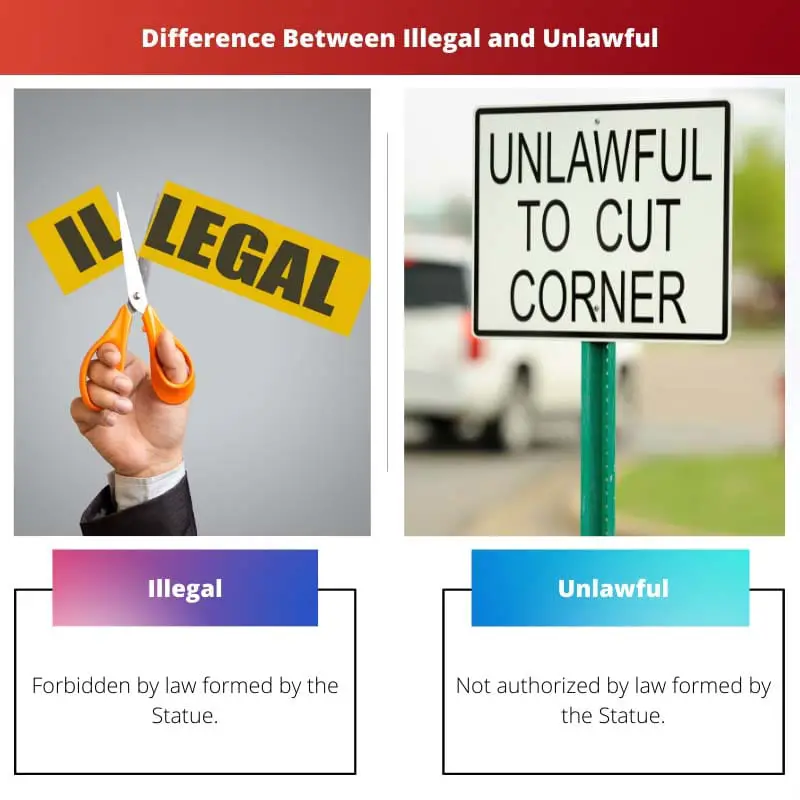Both terms, illegal and unlawful, look similar, but it has many differences in their usage in sentences and also under the law.
Illegal means any act which is specifically or explicitly forbidden by law and cannot be justified by any means, whereas unlawful means any act going against what is allowed.
Illegal necessarily means unlawful, but all unlawful acts do not mean illegal.
Key Takeaways
- “Illegal” actions violate statutory laws, while “unlawful” actions breach common or civil laws.
- Illegal activities may result in criminal charges and penalties, whereas unlawful actions lead to civil disputes and lawsuits.
- Both terms imply a lack of legal authorization but apply to different areas of law.
Illegal vs Unlawful
“Illegal” refers to actions that are specifically prohibited by law and when it directly contravenes a statute or regulation. “Unlawful” refers to actions that violate a general principle of law or a moral or ethical norm, even if no specific statute or regulation is prohibiting it.

Illegal is an act that is forbidden by law and in case of an illegal act, the law may impose strict punishments. The word “legal” is derived from the Latin word “legalis” signifying pertaining to law.
Illegal is also an adjective that makes partial changes to both nouns or a pronoun. The prefix “il” means “not” and “legal” means pertaining to law.
Together, the word illegal means “Not pertaining to the law or forbidden by law.”
Unlawful is an act that does not directly violate the law as there will be no separate law for such action but will be considered as unethical under the law.
Unlawful also ends up in consequences, but it comes under a separate law which will be decided by the respective court subject to.
The term “unlawful” is an old English word with the prefix “un” meaning no, and together, it signifies not lawful.
Comparison Table
| Parameters of Comparison | Illegal | Unlawful |
|---|---|---|
| Definition | Forbidden by law formed by the Statue. | Not authorized by law formed by the Statue. |
| Consequences of such an event | Punishment specified under breaking of respective laws. | Punishment is decided by the court by a separate law. |
| Scope | Illegal necessarily means unlawful. | Unlawful does not mean illegal. |
| Formation | The Latin word “legalis” means pertaining to law and the prefix “il” means not. | Old English word |
| Example | Sale of prohibited drugs, jumping traffic lights, prosecution, etc. | Unethical business practices, discrimination, etc. |
What is Illegal?
Illegal is an act that is forbidden or prohibited by law formed by the statute or any other legislative authority and happening of such unlawful events will result in serious consequences or punishments which will be specified under the breaking of respective laws.
Illegal is derived from the Latin word “legalis” which means pertaining to law or related to law, and the prefix “il” means not.
Altogether, illegal means not pertaining to the law or following the law. Illegal is an adjective that makes partial changes in nouns or pronouns.
For example, the sale of prohibited drugs, prosecution, murder, and all those civil wrongs will be considered illegal and is strictly punished under the law.
For each illegal act, there are separate sections in the law that will conclude the punishments for every lawbreaker.
In other words, illegal means committing an act that is explicitly considered unethical or unjustified by the law.
For any act to be considered illegal, there has to be a law necessarily passed by legislative authority or the statute. The law not only includes the rules and regulations passed by the legislative authority of Parliament.
The term “law” also includes Judicial precedents, which mean previous court judgments which is not a part of existing law.

What is Unlawful?
Unlawful is an act that is not forbidden by law explicitly but considered immoral or unethical or implicitly forbidden by law, and happening of such unlawful acts might end up in serious consequences or punishments which will be decided by the court under a separate law.
The word “Unlawful” is derived from an old English word, and the prefix “un” means not, and together, unlawful means not lawful.
For any act to be considered unlawful, there must be no specific law formed by the statute or legislative authority. It will be decided by the court, and consequences will fall under a separate law.
For example, any unethical business practices or discriminations are considered unlawful. Any unlawful act does not necessarily mean an illegal act.
In other words, Unlawful is an act that is not authorized by the Statue or any other legislative authority.
There is an act specifically formed for the prevention of unlawful activities called The Unlawful Activities (Prevention) Act of 1967.
This act is formed to prevent unlawful activities undertaken by businesses, natural persons or individuals and, legal persons, etc. In short, an unlawful act is an act that is contrary or opposition to the law implicitly.

Main Differences Between Illegal and Unlawful
- Illegal requires the breaking of a specific law, while unlawful is just an act that is considered unethical or immoral by law formed by the statute or any other legislative authority.
- Both are punishable. Illegal activities are punishable under specified existing laws, whereas unlawful activities are punished under separate laws decided by the court.
- Illegal activities necessarily mean unlawful, whereas Unlawful does not necessarily mean illegal.
- Illegal is derived from the Latin word “legalis” and unlawful is an old English word.
- Examples of illegal activities are the sale of drugs, prosecution, or murder, and examples of unlawful activities are unethical business practices, discrimination, etc.



